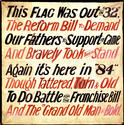 In the 1830s the twin Reforms of Parliament (1832) and Town Councils (1833) opened up the political process to a greater degree of representation. In effect this now meant a middle class electorate and control by the Liberal Party. Such was the Liberal dominance in Glasgow that it effectively incorporated much of Conservatism, as well as working class radicalism. In this dynamic industrial city the appeal of retrenchment, reform, free trade, temperance, and self-improvement across the social classes meant that Liberalism represented the predominant ethos of Glasgow.
In the 1830s the twin Reforms of Parliament (1832) and Town Councils (1833) opened up the political process to a greater degree of representation. In effect this now meant a middle class electorate and control by the Liberal Party. Such was the Liberal dominance in Glasgow that it effectively incorporated much of Conservatism, as well as working class radicalism. In this dynamic industrial city the appeal of retrenchment, reform, free trade, temperance, and self-improvement across the social classes meant that Liberalism represented the predominant ethos of Glasgow.
 Not until the 1880s did this Liberal dominance begin to be opposed. Socialism emerged in this decade, believing that the individual had to be sacrificed for the greater good of the community as a whole, challenging the Liberal belief in the intellectual supremacy of individualism. Of more immediate consequence was the split over Home Rule for Ireland and the formation of the Liberal Unionist Party which co-operated closely with the Conservatives. These parties, which merged into the Scottish Unionist Association in 1912, won three seats at the 1886 general election and took all seven Glasgow constituencies at the "khaki" election of 1900 fought during the Boer War.
Not until the 1880s did this Liberal dominance begin to be opposed. Socialism emerged in this decade, believing that the individual had to be sacrificed for the greater good of the community as a whole, challenging the Liberal belief in the intellectual supremacy of individualism. Of more immediate consequence was the split over Home Rule for Ireland and the formation of the Liberal Unionist Party which co-operated closely with the Conservatives. These parties, which merged into the Scottish Unionist Association in 1912, won three seats at the 1886 general election and took all seven Glasgow constituencies at the "khaki" election of 1900 fought during the Boer War.
 The following election (1906), fought over free trade, saw the Liberals regain their majority but, alongside two Liberal Unionists, there was for the first time a Labour MP from a victory secured in Blackfriars and Hutchesontown with Irish support. This represented the balance of forces in Glasgow until the eve of war in 1914. With Labour a minority and the Unionist threat contained, Glasgow remained a Liberal city. By the end of the First World War that situation would change utterly.
The following election (1906), fought over free trade, saw the Liberals regain their majority but, alongside two Liberal Unionists, there was for the first time a Labour MP from a victory secured in Blackfriars and Hutchesontown with Irish support. This represented the balance of forces in Glasgow until the eve of war in 1914. With Labour a minority and the Unionist threat contained, Glasgow remained a Liberal city. By the end of the First World War that situation would change utterly.